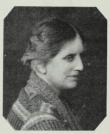M. L. Skinner moved with her family to England and Ireland in 1878, and then attended an academy for young ladies in Edinburgh. In 1887, Skinner, who had been a keen student, had to abandon her formal schooling because of an ulcerated cornea. After an operation partially restored her sight, she began to write poems and stories, and learned singing and cookery. Later Skinner trained as a nurse at the Evelina Hospital for Children, London, and at the Metropolitan Convalescent Home for Children. She served as a V.A.D. during World War II.
Skinner wrote for the London Daily Mail while nursing at the Royal Hospital for Women and Children until she and her mother returned to Perth in 1900, where Skinner was employed privately in Perth hospitals. She continued to write and was published in the Western Mail, West Australian, Daily News and Hospital and Nursing Mirror (London). She also worked briefly as a social writer on the Morning Herald. Skinner returned to London in 1907 to study midwifery. As a result she produced a textbook, Midwifery Made Easy (1912), and worked in the London slums.
In 1913 Skinner went to Kashmir, India, to recuperate from neuritis, and in the following year she joined Lady Minto's Private Nursing Service, later transferring to Queen Alexandra's Imperial Military Nursing Service and serving in India and Burma. Letters of a V.A.D. (1918) recounts her war experiences. In 1917 she joined the Australian Imperial Force and established hospitals in the bush at Wagin and Katanning, Western Australia. Her last nursing post was in World War II at the Moore River Aboriginal Settlement. As a result of this position she published Men Are We (1927), a collection of prose about Aborigines.
In 1922, D. H. and Frieda Lawrence stayed at a guesthouse in Darlington which was co-managed by Skinner, and she and Lawrence collaborated in the writing of The Boy in the Bush and the unpublished novel, 'Eve in the Land of Nod'. From 1934 Skinner received a Commonwealth Literary Fund pension, but continued to write. A staunch supporter of the Western Australian branch of the Fellowship of Australian Writers, Skinner was awarded life membership in the early 1950s, and her literary papers, including radio plays, were acquired by the Battye Library.
(Source: Australian Dictionary of Biography)
 7475401319282401605.jpg
7475401319282401605.jpg